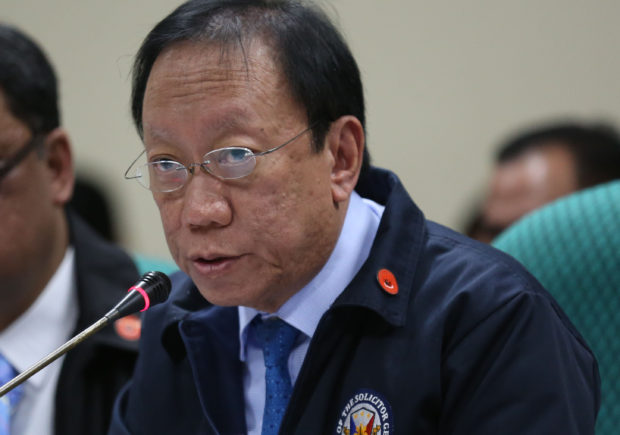SolGen still owns security firm
President Rodrigo Duterte’s primary legal defender may have further fanned the flames of the controversy engulfing him.
Solicitor General Jose Calida has admitted that he has yet to divest himself of his business interest in a private security company that has snared more than P150 million in contracts from various government agencies since 2016.
Calida, however, insists that he should not be faulted for conflict of interest as Vigilant Investigative and Security Agency Inc. (Visai), a company wholly owned by him and his family, won the contracts through competitive bidding.
In a statement issued by his office on Monday night, Calida said he quit his post as president and chair of Visai a month before the President appointed him to head the Office of the Solicitor General (OSG) in June 2016.
Majority owner
Records from the Securities and Exchange Commission (SEC) show that Calida owns 60 percent of Visai, while the remaining shares in the company belong to his wife and other members of their family.
“That he has not yet divested his interest in [Visai] is of no moment since the requirement of the law is either to resign from the management of the enterprise and/or divest himself of his interest in it,” the OSG statement said.
“To reiterate, the OSG is not the approving authority for the subject contracts, which were all obtained through public bidding in accordance with law. Neither is the OSG in the business of licensing, regulating or supervising security agencies such as [Visai],” it said.
Calida also parried allegations that he should be held for graft and corruption, saying those who were flogging him over the issue just wanted to hit back at him for bringing the quo warranto petition in the Supreme Court that led to the removal of Chief Justice Maria Lourdes Sereno on May 11.
As a rule in statutory construction, Calida argued, the use of the word “or” in existing laws gives an individual the option to “select one to the exclusion of others.”
In fact, he said, the Supreme Court ruled in May 1997 that “in the absence of any showing that a business interest will result in a conflict of interest, divestment of the same is unnecessary.”
“The allegation that there is conflict of interest is baseless,” Calida said. “All said, the allegations against [me] are totally baseless and concocted.”
Cabinet rank
But Calida appeared to have contradicted himself on his status in the Duterte Cabinet.
He said the limits imposed on Cabinet members as stipulated in Article VII, Section 13 of the 1987 Constitution should not be applied to him “for the simple reason that he is not a member of the Cabinet, although he is conferred Cabinet rank” under the law.
He said Section 3(i) of Republic Act No. 6713, or the Code of Conduct and Ethical Standards for Public Officials and Employees, spelled out conflict of interest as a situation where a public official “is a member of a board, an officer or a substantial stockholder of a private corporation or owner or has a substantial interest in a business, and the interest of such corporation or business, or his rights or duties therein, may be opposed to or affected by the faithful performance of official duty.”
Calida said the general information sheet that Visai submitted to the SEC would show that he had already stepped down as executive of the private security agency.
But Section 4(a) of the ethics law also states that it is “unlawful for any person having family or close personal relation with any public official to capitalize or exploit or take advantage of such family or close personal relation by directly or indirectly requesting . . . pecuniary advantage from any other person having some business, transaction, application, request or contract with the government.”
A retired businesswoman, Jocelyn Marie Acosta, has sued Calida in the Office of the Ombudsman for graft, malversation and misconduct over his failure to divest himself of his majority stake in Visai.
Acosta claims Calida violated the law mandating public officials to divest themselves of their business interests within 30 days of assuming office or their shareholdings within 60 days.
Calida also maintained that the OSG was not under the supervision of the Department of Justice (DOJ), one of the state agencies that awarded contracts to Visai in 2017.
Presumption of regularity
Sought for comment, Justice Secretary Menardo Guevarra opted not to pass judgment on Calida’s supposed impropriety, echoing the solicitor general’s argument that it was Visai, not the OSG, that bagged a contract from the DOJ.
“For now, let’s presume that the contracts were validly entered into unless it could be shown that procurement laws were violated,” Guevarra said in a text message to the Inquirer.
“In the future, however, [the] DOJ should exercise more circumspection [in awarding of contracts],” he said.
Sen. Francis Pangilinan, president of the opposition Liberal Party, on Monday said Calida should follow Wanda Tulfo-Teo, who resigned as secretary of tourism on May 8 after state auditors questioned P60 million in advertisements that her department placed with the government-run television station PTV 4 for a blocktime program run by her brother Ben Tulfo.
On Tuesday, Albay Rep. Edcel Lagman said Calida’s resignation from Visai was not enough and that the solicitor general should not have allowed the company, which remains owned by his family, from going after government contracts.
Lagman said Calida should have divested himself of his holdings in Visai. —WITH A REPORT FROM JEROME ANING
RELATED VIDEO

